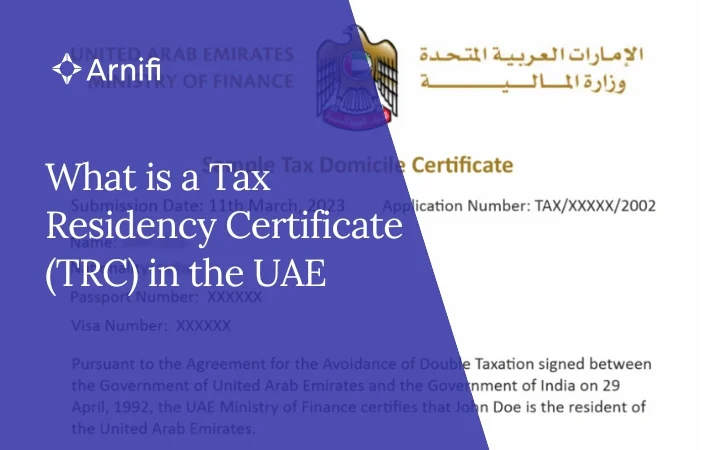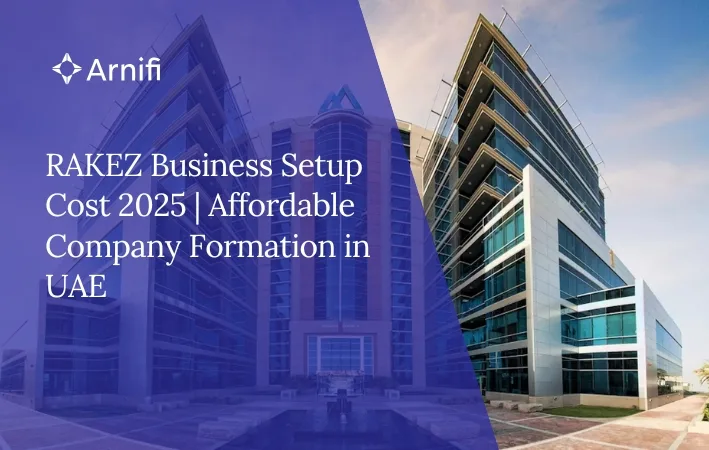Your Essential Guide to the Tax System in Dubai
by Manu Midha Nov 25, 2023  10 MIN READ
10 MIN READ
The tax system in Dubai can be confusing, especially for experts. In this post, we cover personal, property, and corporate taxes, including how each works. We’ll also discuss obtaining a tax residency certificate and its benefits. We examine the impact on businesses and individuals, recent changes in Dubai’s tax laws, and future predictions. Gain insights into Dubai’s tax policies and plan your finances accordingly.

What are the tax laws in Dubai?
Dubai is known for its favorable tax laws, as it does not impose personal income tax or corporate tax on most businesses. However, there are specific taxes in Dubai, such as the Value Added Tax (VAT) which is 5% on goods and services, and customs duties on certain imported goods.
Dubai has a tax-free policy for personal income, meaning individuals do not have to pay income tax. However, there are certain indirect taxes in Dubai, such as in the United Arab Emirates
The United Arab Emirates is known for its low tax rates, and Dubai is no exception. Dubai has a favorable tax environment compared to many other countries around the world. There are no personal income taxes, capital gains taxes, or value-added taxes (VAT) in Dubai. However, businesses are required to pay corporate taxes on their profits. The corporate tax rate in Dubai is fixed at 15%, which is one of the lowest in the world. Additionally, Dubai has several free zones where companies can operate with zero corporate and personal taxes.
e Added Tax (VAT) which is 5%. Additionally, there may be specific taxes in certain industries and sectors.
Understanding the Tax System in Dubai
Dubai follows a territorial model of taxation, with no personal income tax, capital gains tax, or value-added tax. The business-friendly tax structure attracts both local and foreign investors, administered by the Dubai Tax Authority, FTA, ensuring compliance and fair taxation. This system aligns with economic activities, fostering growth and development in the region.
Different Tax Classifications in Dubai
Within Dubai’s tax system, various classifications cater to the diverse taxation needs of businesses, real estate, and individuals. These classifications vary depending on income levels, business structures, and economic activities carried out in the emirate. Specifically, Dubai’s tax regime distinguishes between property taxes, income taxes, and business-related taxes, ensuring that each category aligns with the specific financial responsibilities of private companies and sole proprietorships. Moreover, Dubai’s tax laws outline clear tax registration and compliance requirements for small corporations and startups, contributing to a transparent and structured taxation environment that supports economic development.
Personal Taxation in Dubai
Dubai’s tax laws ensure exemption from personal income tax, allowing for tax-free personal income. The tax structure in Dubai guarantees that residents are not burdened with personal income tax on salaries, dividends, or capital gains, fostering a conducive environment for financial institutions and small businesses to thrive. Additionally, Dubai’s taxation system provides limited liability protection, safeguarding the personal assets of business owners and supporting business entity formation by streamlining personal liability and taxation. This favorable taxation framework aligns with the vision of Dubai as a global economic hub, attracting entrepreneurs and investors from around the world.
Tax for Resident Individuals in Dubai

Taxation rules in Dubai necessitate the enrollment for personal tax, streamlining tax conformity for inhabitants. The tax statutes in Dubai guarantee tax-exempt earnings, advantageous for local and expat residents alike. Dubai’s tax framework advocates for personal tax registration, allowing tax-free personal revenue up to a specified threshold. The tax system in Dubai offers tax registration services for residents, ensuring precise tax submissions. The tax-free environment in Dubai attracts professionals, entrepreneurs, and investors, promoting economic growth and prosperity. This favorable tax system enhances the lifestyle and financial well-being of individuals living and working in Dubai, making it an attractive destination for global talent and business ventures.
Tax for Non-residents and Foreigners in Dubai
Dubai’s tax structure exempts non-residents and foreigners from personal income tax, encouraging international cooperation. The attractive tax benefits support a tax-free environment that promotes economic activities and global business engagement. The Dubai tax authority facilitates tax registration for non-residents, ensuring compliance and transparency. Dubai’s tax regime aligns with international standards, making it appealing to global investors and entrepreneurs. This approach fosters economic growth and positions Dubai as a favorable destination for international business, in line with the region’s commitment to global economic integration and cooperation.
Property Taxes in Dubai
Dubai’s property tax system supports real estate development with various components such as rental tax, property transfer tax, and registration fees. These regulations, governed by Dubai tax laws, promote transparency, fairness, and a conducive environment for property investment. The favorable property tax structure attracts domestic and international investors, stimulating the real estate market and contributing to economic growth. Dubai’s taxation framework has made it an attractive destination for property investment, aligning with the region’s broader economic objectives.
Property Rental Tax
Dubai’s property rental tax regulations aim to maintain equity in taxation for both property owners and tenants, fostering a balanced approach within the real estate market. Governed by Dubai’s property tax laws, rental tax guidelines offer clarity and consistency in property rental transactions, contributing to a stable rental market and real estate sector. The Dubai Property Tax Authority business assumes the responsibility of administering rental tax, overseeing tax collection, and property tax assessments to ensure compliance with property rental tax regulations. This tax-efficient property rental market framework aligns with Dubai’s commitment to fostering real estate investment and leasing activities, promoting a thriving environment for property stakeholders.

Property Transfer Tax
Dubai’s property transfer tax structure ensures smooth property ownership transfers in compliance with taxation guidelines. The process, governed by Dubai’s property tax laws, promotes transparency and seamless transitions. Tax regulations support compliance with property transfer tax during ownership changes. The property tax authority oversees administration, promoting tax compliance and market stability. The regime encourages property investment by balancing tax obligations for buyers and sellers, contributing to market stability and growth.
Property Registration Fees in Dubai
Property registration fees in Dubai are crucial for supporting real estate development and documenting property ownership. The property tax laws provide clarity on these fees, ensuring legal compliance and upholding ownership rights. Transparency in fee structure eases registration for both buyers and sellers. Administered by the Dubai Property Tax Authority, these fees maintain tax records and contribute to a robust market.
Dubai’s property tax regime fosters growth in real estate transactions and the overall market. It promotes a fair and transparent system, enabling smooth property transfers and maintaining sector stability.
Corporate Taxes in Dubai
Dubai’s tax-free environment positions it as an ideal business location in the Middle East. Unlike countries like the United States, Hong Kong, India, and China which have corporate taxes, Dubai fosters economic activities and innovation with no taxes on corporate profits, personal income, or capital gains. This advantageous tax climate enhances its reputation as a global business destination and a strategic bridge between East and West.
Excise Tax in Dubai
Dubai’s excise tax discourages the consumption of unhealthy items and promotes a healthier lifestyle. It primarily targets tobacco, energy drinks, and carbonated beverages. The generated revenues support public services, healthcare, and social welfare initiatives. The tax also aligns with global efforts to combat climate change by reducing the use of environmentally harmful products. Overall, it promotes public welfare and environmental sustainability in Dubai.
Export and Import Tax in Dubai
Dubai’s import and export tax regime plays a pivotal role in stimulating international trade within the region. The minimal customs duties levied in Dubai have positioned the city as a strategic hub for global trade operations, facilitating cost-effective access to international markets. Moreover, the tax policies on imports and exports are designed to streamline business operations, fueling economic growth and business expansion. These incentives contribute to positioning Dubai as an attractive gateway for businesses looking to expand their global reach.
ALSO READ: Ways to hire people for your venture in the UAE
Tax Residency Certificate in Dubai
A crucial document in the tax landscape, the tax residency certificate (TRC) serves as an official confirmation of an individual’s tax status. Holding this certificate offers a host of benefits, enabling international tax compliance and providing avenues for claiming tax benefits under double tax treaties. Moreover, it holds strategic importance for individuals seeking tax exemptions on foreign income. Notably, Dubai’s TRC presents unique advantages for tax planning and asset protection, making it an essential tool for individuals navigating the intricacies of global taxation.
Benefits of Having a Tax Residency Certificate
Optimizing tax efficiency is achievable through the possession of a tax residency certificate, mitigating tax liability effectively. Individuals gain access to tax relief and benefits, promoting financial stability and security. A tax residency certificate serves as a tool for cross-border tax planning, reducing tax burdens across international boundaries. Legal protection against tax disputes is ensured, leading to compliance with tax regulations. Structuring financial affairs in a tax-efficient manner is empowered by the possession of a tax residency certificate.
Impact of Dubai’s Tax Policies on Individuals
Dubai’s tax policies have a significant impact on personal income tax, tax residency, and tax obligations, ultimately shaping financial planning, tax compliance, and personal wealth management. To sum it all:
- Dubai’s tax-efficient environment allows individuals to structure their finances, assets, and investments in a way that minimizes tax burdens and maximizes tax benefits.
- Dubai’s tax policies influence tax residency, tax exemptions, and tax treaties, offering individuals tax advantages, financial security, and flexibility in tax planning.
- Individuals should be aware that these policies also have an impact on tax registration, tax compliance, and tax administration, making it essential to adhere to tax regulations and fulfill tax obligations.
Challenges of Dubai’s Tax Policies for Individuals

– Navigating Dubai’s tax policies can be challenging for individuals
– Professional tax advice and planning services may be necessary to ensure compliance and maximize benefits
– Individuals must be aware of tax regulations, implications, and changes that can affect their tax liability and reporting requirements
– Keeping accurate tax records and financial transparency is crucial for personal income tax and residency status
– Staying informed about tax laws, obligations, and potential risks, uncertainties, and disputes is essential for effective tax management
Future of Taxation in Dubai
The tax system in Dubai has a significant impact on personal income tax, residency, financial planning, compliance, wealth management, individual taxation, liability, planning, financial decisions, and estate strategies. Dubai’s tax-efficient environment helps individuals structure their finances, assets, and investments to minimize burdens and maximize benefits. The policies also affect residency exemptions and treaties, providing advantages, security, and flexibility. It is important to understand that these policies impact registration, compliance, and administration and require adherence to regulations and obligations.
About Arnifi
Arnifi is digital first Corporate service provider helping companies enter the Middle East region, starting with UAE and Saudi Arabia markets. Founded and backed by professionals from Amazon, Souq and other large companies operating in KSA – the team understands what it takes to succeed as a startup in both UAE and Saudi Arabian markets, apart from going through the setup process multiple times. Arnifi will provide a truly digital experience to entry and scale up of companies both UAE and Saudi Arabia. The Arnifi promise is simple, yet revolutionary, use technology and a great team to provide transparency, efficiency and great customer experience in the whole process. Check out at – www.Arnifi.com for more details.
Top UAE Packages

Related Articles
Top UAE Packages



